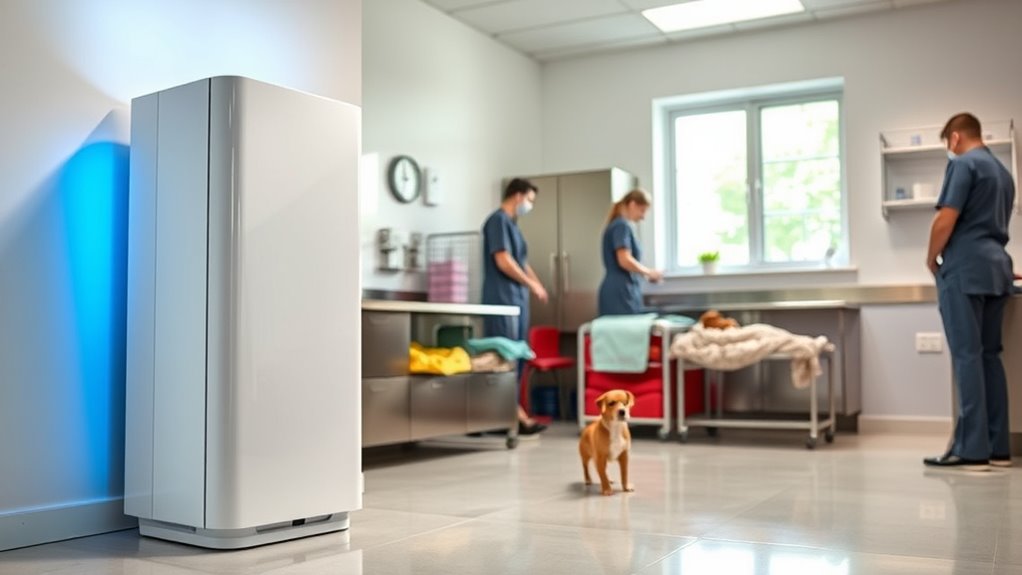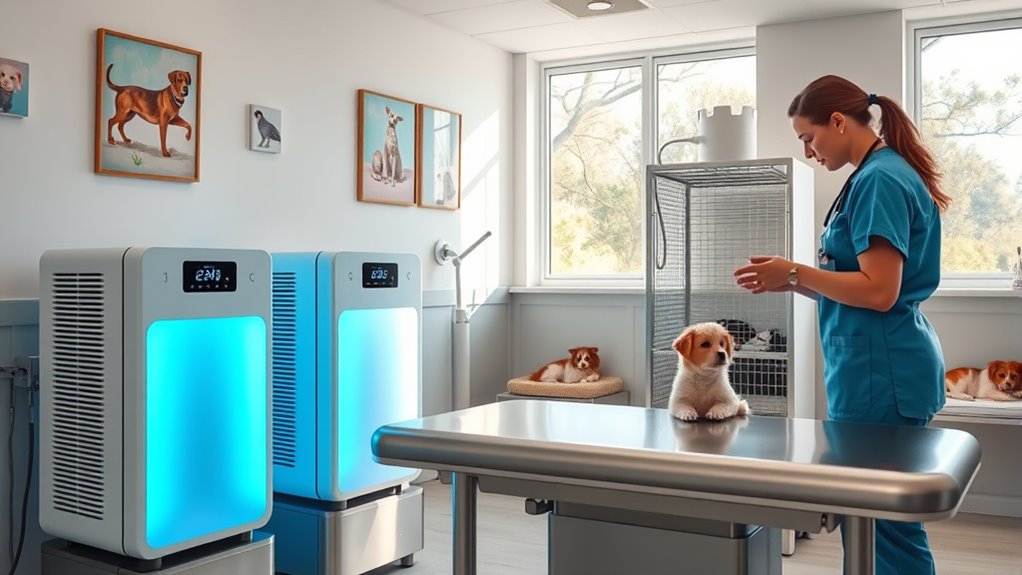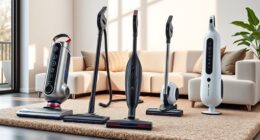Air purifiers are key tools in veterinary clinics and pet boarding facilities to improve air quality by trapping pet dander, bacteria, and airborne viruses. They help reduce allergen exposure, support pets with respiratory issues, and create a healthier environment for staff and animals. Using advanced filtration technology like HEPA filters, these devices also control odors and reinforce hygiene standards. To discover how selecting the right air purifier can benefit your facility, keep exploring the options available.
Key Takeaways
- Air purifiers remove pet dander, bacteria, and airborne pathogens, improving hygiene and reducing infection risks in veterinary and boarding facilities.
- Advanced HEPA filtration captures small particles like dust, pollen, mold spores, and some viruses, enhancing overall air quality.
- Using air purifiers alleviates respiratory issues and allergies in pets, supporting their health and comfort.
- Improved air quality creates a cleaner, odor-free environment, boosting client confidence and clinic professionalism.
- Promoting healthier air reduces stress for animals and staff, aiding faster recovery and enhancing overall well-being.

Air purifiers play a crucial role in maintaining a clean and healthy environment in veterinary clinics, where exposure to pet dander, bacteria, and airborne pathogens is common. When you prioritize air quality, you’re actively reducing the risk of infections and allergic reactions, which benefits both your staff and your patients. Poor air quality can lead to respiratory issues, stress, and even compromised immune systems in pets. By installing high-efficiency air purifiers, you guarantee that harmful particles are captured and eliminated, creating a safer space for animals and people alike.
Air purifiers reduce airborne pathogens and allergens, ensuring a safer, healthier environment for pets and staff.
You might notice that pets with existing respiratory conditions or allergies are especially sensitive to airborne irritants. Using air purifiers helps filter out allergens such as pet dander, dust, pollen, and mold spores, alleviating discomfort and supporting pet health. This is particularly important in clinics where multiple animals come and go, each with different health needs. Clean air reduces the likelihood of cross-contamination and prevents the spread of airborne bacteria and viruses, which can be life-threatening in immunocompromised animals. Additionally, many air purifiers employ advanced filtration technology, ensuring even the smallest particles and pathogens are effectively removed from the environment.
Furthermore, maintaining excellent air quality directly impacts your clinic’s hygiene standards. Air purifiers equipped with HEPA filters are capable of trapping particles as small as 0.3 microns, including bacteria and some viruses. This not only improves air quality but also helps in controlling odors that can be unpleasant for both staff and clients. When your environment smells fresher, it reflects well on your practice and reassures pet owners that their animals are in a safe, clean setting.
Pet health is directly linked to the air quality in your clinic. Clean air supports faster recovery, reduces stress, and prevents secondary health issues caused by airborne irritants. When you invest in effective air purification systems, you demonstrate your commitment to the well-being of the animals in your care. Improved air quality can also enhance staff productivity and morale, as working in a cleaner, healthier environment reduces fatigue caused by poor air conditions.
Frequently Asked Questions
How Often Should Air Filters Be Replaced in Veterinary Clinics?
You should replace air filters in veterinary clinics every 3 to 6 months, depending on usage and filter type. Regular filter maintenance is essential to guarantee ideal air quality and system efficiency. Keep an eye on your filters; if they look dirty or clogged sooner, replace them sooner. Following a consistent replacement schedule helps prevent allergens, bacteria, and odors from lingering, creating a healthier environment for pets and staff alike.
Are Certain Air Purifiers More Effective for Pet Allergens?
You’ll find that HEPA filtration air purifiers are especially effective for pet allergens, as they trap tiny particles like dander and pollen. For example, a pet owner noticed significant allergy relief after switching to a HEPA unit with activated carbon, which also absorbs odors. Combining HEPA filters with activated carbon enhances allergen removal and odor control, making these purifiers ideal for spaces with sensitive pets or allergy-prone individuals.
Do Air Purifiers Emit Noise That Could Disturb Animals?
Air purifiers can emit noise that might disturb animals, but many models are designed with low noise levels to guarantee animal comfort. You should choose units labeled as quiet or with adjustable settings, so you can minimize disruptions. By paying attention to noise levels, you help maintain a calm environment for animals, reducing stress and promoting better well-being during their stay or treatment.
Can Air Purifiers Help Reduce the Spread of Zoonotic Diseases?
Think of an air purifier as a shield against invisible enemies. Yes, it can help reduce the spread of zoonotic diseases by capturing airborne pathogens. When you use one effectively, it minimizes zoonotic transmission risks, protecting animals and humans alike. By filtering out harmful particles, you create safer environments, making it harder for airborne pathogens to linger and cause infection, ensuring everyone stays healthier.
What Are the Energy Consumption Considerations for Continuous Use?
You should consider energy efficiency and power consumption when using air purifiers continuously. Opt for models with energy-saving features to reduce electricity use and minimize operational costs. Check the unit’s power consumption ratings and look for Energy Star-certified options, which are designed for lower energy use. Regular maintenance also helps guarantee peak performance, preventing unnecessary energy drain and extending the lifespan of your air purifier.
Conclusion
By choosing air purifiers for your veterinary clinic or pet boarding facility, you’re not just improving air quality—you’re creating a safer haven. While cleaning surfaces removes visible dirt, air purifiers eliminate invisible allergens and pathogens, offering peace of mind. In a space where health matters most, don’t settle for just the obvious—embrace technology that fights unseen threats. After all, a clean environment isn’t just about what you see; it’s about what you can’t see but truly makes a difference.









